- Home
- Ernest Hemingway
The Snows of Kilimanjaro and Other Stories
The Snows of Kilimanjaro and Other Stories Read online
THE HEMINGWAY EBOOK COLLECTION
Across the River and Into the Trees
By-Line: Ernest Hemingway
The Dangerous Summer
Dateline: Toronto
Death in the Afternoon
A Farewell to Arms
The Fifth Column and Four Stories of the Spanish Civil War
For Whom the Bell Tolls
The Garden of Eden
Green Hills of Africa
In Our Time
Islands in the Stream
Men Without Women
A Moveable Feast
The Old Man and the Sea
The Short Stories of Ernest Hemingway
The Snows of Kilimanjaro and Other Stories
The Sun Also Rises
To Have and Have Not
The Torrents of Spring
True at First Light
Winner Take Nothing
Ernest Hemingway on Writing
SCRIBNER
1230 Avenue of the Americas
New York, NY 10020
This book is a work of fiction. Names, characters, places, and incidents either are products of the author’s imagination or are used fictitiously. Any resemblance to actual events or locales or persons, living or dead, is entirely coincidental.
“In Another Country” and “The Killers”
copyright 1927 by Charles Scribner’s Sons
Copyright renewed © 1955 by Ernest Hemingway
“Fifty Grand” copyright 1927 by Ernest Hemingway
Copyright renewed © 1955 by Ernest Hemingway
“The Gambler, the Nun, and the Radio”; “Fathers and Sons”;
“A Way You’ll Never Be” copyright 1933 by Charles Scribner’s Sons
Copyright renewed © 1961 by Mary Hemingway
“A Clean, Well-Lighted Place” and “A Day’s Wait”
copyright 1933 by Ernest Hemingway
Copyright renewed © 1961 by Mary Hemingway
“The Short Happy Life of Francis Macomber” and “The Snows of
Kilimanjaro” copyright 1936 by Ernest Hemingway
Copyright renewed © 1964 by Mary Hemingway
All rights reserved, including the right of reproduction in whole or in part in any form.
SCRIBNER and design are trademarks of Jossey-Bass, Inc., used under license by Simon & Schuster, the publisher of this work.
Designed by Brooke Zimmer
First Scribner ebook edition 2002
All inquiries about print and electronic permissions (use of excerpts) for books and other works by Ernest Hemingway can be sent by email to:
[email protected], or by regular mail to Simon & Schuster, Inc., Permissions Dept., 1230 Avenue of the Americas, New York, New York 10020, or by fax to (212) 698-7284.
Visit www.simonsays.com/hemingway for additional information about Ernest Hemingway.
ISBN 0-7432-3732-3
“The Gambler, the Nun, and the Radio” was first published as
“Give Us a Prescription, Doctor.”
CONTENTS
The Snows of Kilimanjaro
A Clean, Well-Lighted Place
A Day’s Wait
The Gambler, the Nun, and the Radio
Fathers and Sons
In Another Country
The Killers
A Way You’ll Never Be
Fifty Grand
The Short Happy Life of Francis Macomber
THE SNOWS OF KILIMANJARO
Kilimanjaro is a snow covered mountain 19,710 feet high, and it is said to be the highest mountain in Africa. Its western summit is called the Masai “Ngàje Ngài,” the House of God. Close to the western summit there is the dried and frozen carcass of a leopard. No one has explained what the leopard was seeking at that altitude.
“The marvellous thing is that it’s painless,” he said. “That’s how you know when it starts.”
“Is it really?”
“Absolutely. I’m awfully sorry about the odor though. That must bother you.”
“Don’t! Please don’t.”
“Look at them,” he said. “Now is it sight or is it scent that brings them like that?”
The cot the man lay on was in the wide shade of a mimosa tree and as he looked out past the shade onto the glare of the plain there were three of the big birds squatted obscenely, while in the sky a dozen more sailed, making quick-moving shadows as they passed.
“They’ve been there since the day the truck broke down,” he said. “Today’s the first time any have lit on the ground. I watched the way they sailed very carefully at first in case I ever wanted to use them in a story. That’s funny now.”
“I wish you wouldn’t,” she said.
“I’m only talking,” he said. “It’s much easier if I talk. But I don’t want to bother you.”
“You know it doesn’t bother me,” she said. “It’s that I’ve gotten so very nervous not being able to do anything. I think we might make it as easy as we can until the plane comes.”
“Or until the plane doesn’t come.”
“Please tell me what I can do. There must be something I can do.”
“You can take the leg off and that might stop it, though I doubt it. Or you can shoot me. You’re a good shot now. I taught you to shoot didn’t I?”
“Please don’t talk that way. Couldn’t I read to you?”
“Read what?”
“Anything in the book bag that we haven’t read.”
“I can’t listen to it,” he said. “Talking is the easiest. We quarrel and that makes the time pass.”
“I don’t quarrel. I never want to quarrel. Let’s not quarrel any more. No matter how nervous we get. Maybe they will be back with another truck today. Maybe the plane will come.”
“I don’t want to move,” the man said. “There is no sense in moving now except to make it easier for you.”
“That’s cowardly.”
“Can’t you let a man die as comfortably as he can without calling him names? What’s the use of slanging me?”
“You’re not going to die.”
“Don’t be silly. I’m dying now. Ask those bastards.” He looked over to where the huge, filthy birds sat, their naked heads sunk in the hunched feathers. A fourth planed down, to run quick-legged and then waddle slowly toward the others.
“They are around every camp. You never notice them. You can’t die if you don’t give up.”
“Where did you read that? You’re such a bloody fool.”
“You might think about some one else.”
“For Christ’s sake,” he said, “That’s been my trade.”
He lay then and was quiet for a while and looked across the heat shimmer of the plain to the edge of the bush. There were a few Tommies that showed minute and white against the yellow and, far off, he saw a herd of zebra, white against the green of the bush. This was a pleasant camp under big trees against a hill, with good water, and close by, a nearly dry water hole where sand grouse flighted in the mornings.
“Wouldn’t you like me to read?” she asked. She was sitting on a canvas chair beside his cot. “There’s a breeze coming up.”
“No thanks.”
“Maybe the truck will come.”
“I don’t give a damn about the truck.”
“I do.”
“You give a damn about so many things that I don’t.”
“Not so many, Harry.”
“What about a drink?”
“It’s supposed to be bad for you. It said in Black’s to avoid all alcohol. You shouldn’t drink.”
“Molo!” he shouted.
“Yes Bwana.”
<
br /> “Bring whiskey-soda.”
“Yes Bwana.”
“You shouldn’t,” she said. “That’s what I mean by giving up. It says it’s bad for you. I know it’s bad for you.”
“No,” he said. “It’s good for me.”
So now it was all over, he thought. So now he would never have a chance to finish it. So this was the way it ended in a bickering over a drink. Since the gangrene started in his right leg he had no pain and with the pain the horror had gone and all he felt now was a great tiredness and anger that this was the end of it. For this, that now was coming, he had very little curiosity. For years it had obsessed him; but now it meant nothing in itself. It was strange how easy being tired enough made it.
Now he would never write the things that he had saved to write until he knew enough to write them well. Well, he would not have to fail at trying to write them either. Maybe you could never write them, and that was why you put them off and delayed the starting. Well he would never know, now.
“I wish we’d never come,” the woman said. She was looking at him holding the glass and biting her lip. “You never would have gotten anything like this in Paris. You always said you loved Paris. We could have stayed in Paris or gone anywhere. I’d have gone anywhere. I said I’d go anywhere you wanted. If you wanted to shoot we could have gone shooting in Hungary and been comfortable.”
“Your bloody money,” he said.
“That’s not fair,” she said. “It was always yours as much as mine. I left everything and I went wherever you wanted to go and I’ve done what you wanted to do. But I wish we’d never come here.”
“You said you loved it.”
“I did when you were all right. But now I hate it. I don’t see why that had to happen to your leg. What have we done to have that happen to us?”
“I suppose what I did was to forget to put iodine on it when I first scratched it. Then I didn’t pay any attention to it because I never infect. Then, later, when it got bad, it was probably using that weak carbolic solution when the other antiseptics ran out that paralyzed the minute blood vessels and started the gangrene.” He looked at her, “What else?”
“I don’t mean that.”
“If we would have hired a good mechanic instead of a half baked kikuyu driver, he would have checked the oil and never burned out that bearing in the truck.”
“I don’t mean that.”
“If you hadn’t left your own people, your goddamned Old Westbury, Saratoga, Palm Beach people to take me on——”
“Why, I loved you. That’s not fair. I love you now. I’ll always love you. Don’t you love me?”
“No,” said the man. “I don’t think so. I never have.”
“Harry, what are you saying? You’re out of your head.”
“No. I haven’t any head to go out of.”
“Don’t drink that,” she said. “Darling, please don’t drink that. We have to do everything we can.”
“You do it,” he said. “I’m tired.”
Now in his mind he saw a railway station at Karagatch and he was standing with his pack and that was the headlight of the Simplon-Orient cutting the dark now and he was leaving Thrace then after the retreat. That was one of the things he had saved to write, with, in the morning at breakfast, looking out the window and seeing snow on the mountains in Bulgaria and Nansen’s Secretary asking the old man if it were snow and the old man looking at it and saying, No, that’s not snow. It’s too early for snow. And the Secretary repeating to the other girls, No, you see. It’s not snow and them all saying, It’s not snow we were mistaken. But it was the snow all right and he sent them on into it when he evolved exchange of populations. And it was snow they tramped along in until they died that winter.
It was snow too that fell all Christmas week that year up in the Gauertal, that year they lived in the woodcutter’s house with the big square porcelain stove that filled half the room, and they slept on mattresses filled with beech leaves, the time the deserter came with his feet bloody in the snow. He said the police were right behind him and they gave him woolen socks and held the gendarmes talking until the tracks had drifted over.
In Schrunz, on Christmas day, the snow was so bright it hurt your eyes when you looked out from the weinstube and saw every one coming home from church. That was where they walked up the sleigh-smoothed urine-yellowed road along the river with the steep pine hills, skis heavy on the shoulder, and where they ran that great run down the glacier above the Madlener-haus, the snow as smooth to see as cake frosting and as light as powder and he remembered the noiseless rush the speed made as you dropped down like a bird.
They were snow-bound a week in the Madlener-haus that time in the blizzard playing cards in the smoke by the lantern light and the stakes were higher all the time as Herr Lent lost more. Finally he lost it all. Everything, the skischule money and all the season’s profit and then his capital. He could see him with his long nose, picking up the cards and then opening, “Sans Voir.” There was always gambling then. When there was no snow you gambled and when there was too much you gambled. He thought of all the time in his life he had spent gambling.
But he had never written a line of that, nor of that cold, bright Christmas day with the mountains showing across the plain that Barker had flown across the lines to bomb the Austrian officers’ leave train, machine-gunning them as they scattered and ran. He remembered Barker afterwards coming into the mess and starting to tell about it. And how quiet it got and then somebody saying, “You bloody murderous bastard.”
Those were the same Austrians they killed then that he skied with later. No not the same. Hans, that he skied with all that year, had been in the Kaiser-Jägers and when they went hunting hares together up the little valley above the saw-mill they had talked of the fighting on Pasubio and of the attack on Pertica and Asalone and he had never written a word of that. Nor of Monte Corno, nor the Siete Commum, nor of Arsiedo.
How many winters had he lived in the Voralberg and the Arlberg? It was four and then he remembered the man who had the fox to sell when they had walked into Bludenz, that time to buy presents, and the cherry-pit taste of good kirsch, the fast-slipping rush of running powder-snow on crust, singing “Hi! Ho! said Rolly!” as you ran down the last stretch to the steep drop, taking it straight, then running the orchard in three turns and out across the ditch and onto the icy road behind the inn. Knocking your bindings loose, kicking the skis free and leaning them up against the wooden wall of the inn, the lamplight coming from the window, where inside, in the smoky, new-wine smelling warmth, they were playing the accordion.
“Where did we stay in Paris?” he asked the woman who was sitting by him in a canvas chair, now, in Africa.
“At the Crillon. You know that.”
“Why do I know that?”
“That’s where we always stayed.”
“No. Not always.”
“There and at the Pavillion Henri-Quatre in St. Germain. You said you loved it there.”
“Love is a dunghill,” said Harry. “And I’m the cock that gets on it to crow.”
“If you have to go away,” she said, “is it absolutely necessary to kill off everything you leave behind? I mean do you have to take away everything? Do you have to kill your horse, and your wife and burn your saddle and your armour?”
“Yes,” he said. “Your damned money was my armour. My Swift and my Armour.”
“Don’t.”
“All right. I’ll stop that. I don’t want to hurt you.”
“It’s a little bit late now.”
“All right then. I’ll go on hurting you. It’s more amusing. The only thing I ever really liked to do with you I can’t do now.”
“No, that’s not true. You liked to do many things and everything you wanted to do I did.”

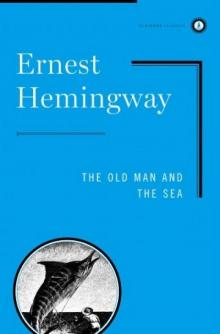 The Old Man and the Sea
The Old Man and the Sea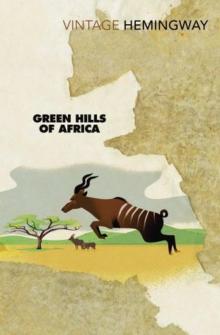 Green Hills of Africa
Green Hills of Africa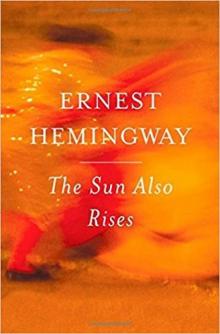 The Sun Also Rises
The Sun Also Rises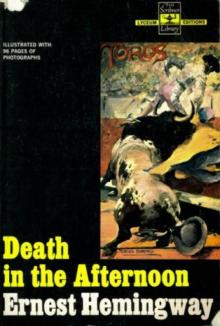 Death in the Afternoon
Death in the Afternoon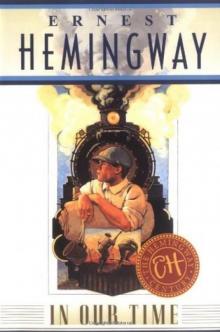 In Our Time
In Our Time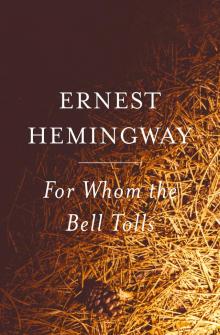 For Whom the Bell Tolls
For Whom the Bell Tolls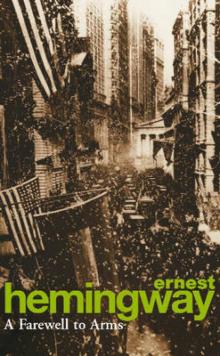 A Farewell to Arms
A Farewell to Arms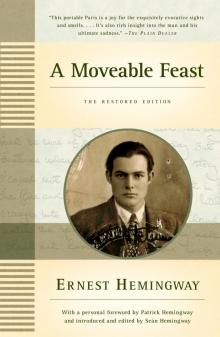 A Moveable Feast
A Moveable Feast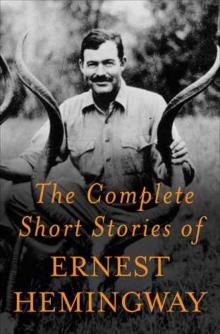 The Complete Short Stories of Ernest Hemingway
The Complete Short Stories of Ernest Hemingway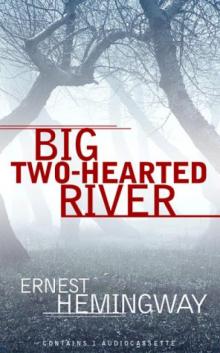 Big Two-Hearted River
Big Two-Hearted River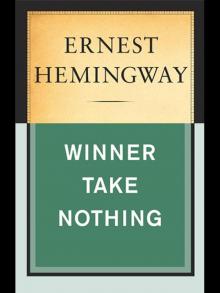 Winner Take Nothing
Winner Take Nothing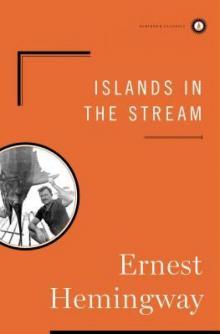 Islands in the Stream
Islands in the Stream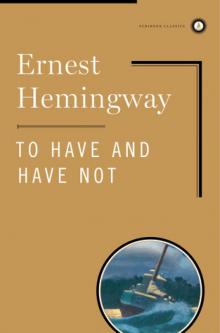 To Have and Have Not
To Have and Have Not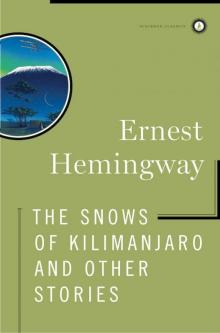 The Snows of Kilimanjaro and Other Stories
The Snows of Kilimanjaro and Other Stories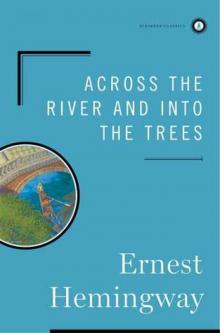 Across the River and Into the Trees
Across the River and Into the Trees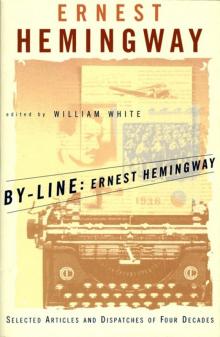 By-Line Ernest Hemingway
By-Line Ernest Hemingway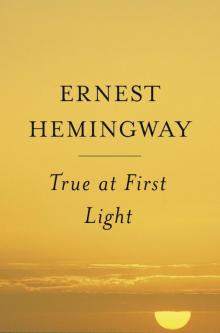 True at First Light
True at First Light Men Without Women
Men Without Women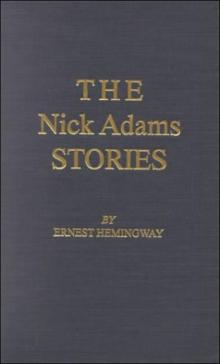 The Nick Adams Stories
The Nick Adams Stories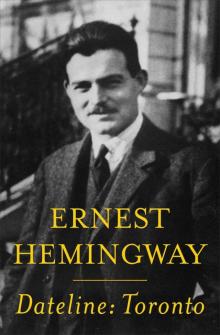 Dateline- Toronto
Dateline- Toronto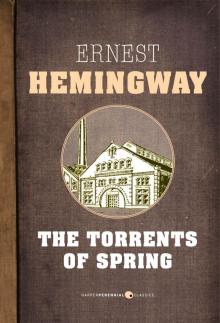 The Torrents of Spring
The Torrents of Spring Short Stories
Short Stories